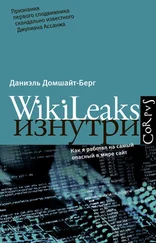Harding, Luke - WikiLeaks - Inside Julian Assange's War on Secrecy
Здесь есть возможность читать онлайн «Harding, Luke - WikiLeaks - Inside Julian Assange's War on Secrecy» весь текст электронной книги совершенно бесплатно (целиком полную версию без сокращений). В некоторых случаях можно слушать аудио, скачать через торрент в формате fb2 и присутствует краткое содержание. Жанр: Старинная литература, на английском языке. Описание произведения, (предисловие) а так же отзывы посетителей доступны на портале библиотеки ЛибКат.
- Название:WikiLeaks: Inside Julian Assange's War on Secrecy
- Автор:
- Жанр:
- Год:неизвестен
- ISBN:нет данных
- Рейтинг книги:3 / 5. Голосов: 1
-
Избранное:Добавить в избранное
- Отзывы:
-
Ваша оценка:
- 60
- 1
- 2
- 3
- 4
- 5
WikiLeaks: Inside Julian Assange's War on Secrecy: краткое содержание, описание и аннотация
Предлагаем к чтению аннотацию, описание, краткое содержание или предисловие (зависит от того, что написал сам автор книги «WikiLeaks: Inside Julian Assange's War on Secrecy»). Если вы не нашли необходимую информацию о книге — напишите в комментариях, мы постараемся отыскать её.
WikiLeaks: Inside Julian Assange's War on Secrecy — читать онлайн бесплатно полную книгу (весь текст) целиком
Ниже представлен текст книги, разбитый по страницам. Система сохранения места последней прочитанной страницы, позволяет с удобством читать онлайн бесплатно книгу «WikiLeaks: Inside Julian Assange's War on Secrecy», без необходимости каждый раз заново искать на чём Вы остановились. Поставьте закладку, и сможете в любой момент перейти на страницу, на которой закончили чтение.
Интервал:
Закладка:
Soon, word spread through the blogosphere that an anonymous local journalist in Basel had stumbled on the Holy Grail. Other German journalists started “retweeting” his posts. Der Spiegel frantically messaged him to make contact. He ignored them. “His Twitter follows rapidly snowballed. We could see it was becoming a serious problem,” admits Der Spiegel ’s Holger Stark. “While we were closing the hole, he had managed to get a copy of the magazine.”
Sitting helplessly in London, Alan Rusbridger realised that the 9.30pm GMT embargo for the release of the cables looked wobbly. “You have five of the most powerful news organisations, and everything was paralysed by a little freelancer. We started having conferences on the hour wondering what to do,” Rusbridger says. There was more bad news. Rival German news organisations contacted Freelancer_09 and asked him to start scanning entire pages of Der Spiegel’s edition. By about 3pm, he had 150 followers, with more joining every minute. By 4pm he had found a scanner, and was pumping the embargoed articles out onto the internet. His followers jumped to around 600. A French mirror site began translating Freelancer_09’s posts. “We realised the story wasn’t going to hold. We had sprung a leak ourselves,” Rusbridger recalls wryly. It was a great irony. Rusbridger had been an early Twitter proselytiser; he had relentlessly encouraged Guardian journalists to sign up to the San Francisco-based micro-blogging site. Now Twitter had turned round and – figuratively speaking – skewered him in the bottom.
The previous day, Saturday, at around 5pm a German technician from Der Spiegel ’s own online service in Hamburg had made an earlier gaffe: he managed to go live on the website with an extract from the edition of the magazine. It gave a few intriguing early details: that there were 251,287 cables; that one cable dated back to 1966, but most were newer than 2004; that 9,005 documents dated from the first two months of 2010. Stark apologised for the accident and said the German link was erased as soon as it was discovered. The screen shots circulated through the net for some time. Then on Sunday afternoon more material appeared on Spiegel ’s popular English-language site. The rumours were now sweeping feverishly across Twitter. The anticipation was reaching bursting point.
The New York Times soon spotted the Spiegel online story. The paper’s executives said the embargo was dead – now effectively meaningless. “What was so brilliant was the irony that of all the people to mess up it was the Germans,” said Katz – not always the Guardian ’s most politically correct representative. Until now, it was the Germans – impeccably ethical at all times – who had managed to avoid the recriminations hurled freely by Assange at both the Americans and the British. Janine Gibson, editor of guardian.co.uk, the Guardian ’s website, compared the pratfall-strewn cables launch to Britain’s 1993 Grand National. That shambolic instalment of the historic horse race was infamously cancelled after two false starts.
“It all got terribly untidy,” Rusbridger says. “But it was the most complicated thing we have ever done, co-ordinating a Spanish morning paper with a French afternoon paper with a German weekly with an American [paper] in a different time zone and a bunch of anarchists in a bunker who would only communicate via Jabber [online instant messaging].”
By 6pm the Guardian and everyone else agreed just to publish, go with it. As though at Nasa’s Mission Control Center in Houston, the Guardian ’s production staff stood poised at the newspaper’s King’s Cross office in front of a flickering bank of screens. Production boss Jon Casson asked: “Will we launch?” Katz replied: “LAUNCH!” The word was taken up and spread instantly across the back bench, the newsroom echoing with the words: “Launch! Launch! Launch!” The world’s biggest leak had gone live.
The Guardian ’s front-page splash made the historic dimensions of the story clear. With David Leigh’s byline, it appeared on guardian.co.uk at 6.13pm. The headline proclaimed: “US embassy cables leak sparks global diplomatic crisis.” It began:
“The United States was catapulted into a worldwide diplomatic crisis today, with the leaking to the Guardian and other international media of more than 250,000 classified cables from its embassies, many sent as recently as February this year. At the start of a series of daily extracts from the US embassy cables – many designated ‘secret’ – the Guardian can disclose that Arab leaders are privately urging an air strike on Iran and that US officials have been instructed to spy on the UN leadership.”
The story went on: “These two revelations alone would be likely to reverberate around the world. But the secret dispatches, which were obtained by WikiLeaks, the whistleblowers’ website, also reveal Washington’s evaluation of many other highly sensitive international issues.”
At 6.15pm the Guardian launched a WikiLeaks live blog, to chart reaction as it came in. More live blogs would follow; they would become an innovative part of the cables coverage. The disclosures in Leigh’s story were the first of many over the next four weeks. Despite its scrappy launch, the publication of the US state department cables amounted to the biggest leak since 1971 when Daniel Ellsberg gave the Pentagon papers to the New York Times , provoking a historic court case and revealing the White House’s dirty secrets in Vietnam. This data spillage was far bigger – an unprecedented release of secret information from the heart of the world’s only superpower.
Nobody could think of a bigger story – certainly not one authored by the media themselves. “You could say the World Trade Center was a bigger story, or the Iraq war. But in terms of a newspaper, where by the act of publication you unleash one story that is then talked about in every single corner of the globe, and you are the only people who have got it, and you release it each day, this was unique,” Rusbridger says.
The US state department had already assembled a team of 120 people, to burn the midnight oil and sift through those cables likely to be disclosed. The department also issued a condemnatory statement. It said: “We anticipate the release of what are claimed to be several hundred thousand classified state department cables on Sunday night that detail private diplomatic discussions with foreign governments. By its very nature, field reporting to Washington is candid and often incomplete information. It is not an expression of policy, nor does it always shape final policy decisions. Nevertheless, these cables could compromise private discussions with foreign governments and opposition leaders, and when the substance of private conversations is printed on the front pages of newspapers around the world, it can deeply impact not only on US foreign policy interests, but those of our allies and friends around the world.” The release of the cables was a “reckless and dangerous action”. It had put lives at risk, the White House declared.
The statement was a damage limitation exercise. Even opponents of WikiLeaks had to acknowledge that some of the disclosures – for example, that the US had spied on UN officials and sought to gather their credit card account numbers – were overwhelmingly in the public interest. The White House, moreover, frequently expressed concern when other authoritarian regimes clamped down on freedom of speech. This testy response when the leak came from inside its own large governmental machinery would provoke the Russians, Chinese, and just about everyone else, to accuse Washington of double standards.
Читать дальшеИнтервал:
Закладка:
Похожие книги на «WikiLeaks: Inside Julian Assange's War on Secrecy»
Представляем Вашему вниманию похожие книги на «WikiLeaks: Inside Julian Assange's War on Secrecy» списком для выбора. Мы отобрали схожую по названию и смыслу литературу в надежде предоставить читателям больше вариантов отыскать новые, интересные, ещё непрочитанные произведения.
Обсуждение, отзывы о книге «WikiLeaks: Inside Julian Assange's War on Secrecy» и просто собственные мнения читателей. Оставьте ваши комментарии, напишите, что Вы думаете о произведении, его смысле или главных героях. Укажите что конкретно понравилось, а что нет, и почему Вы так считаете.












